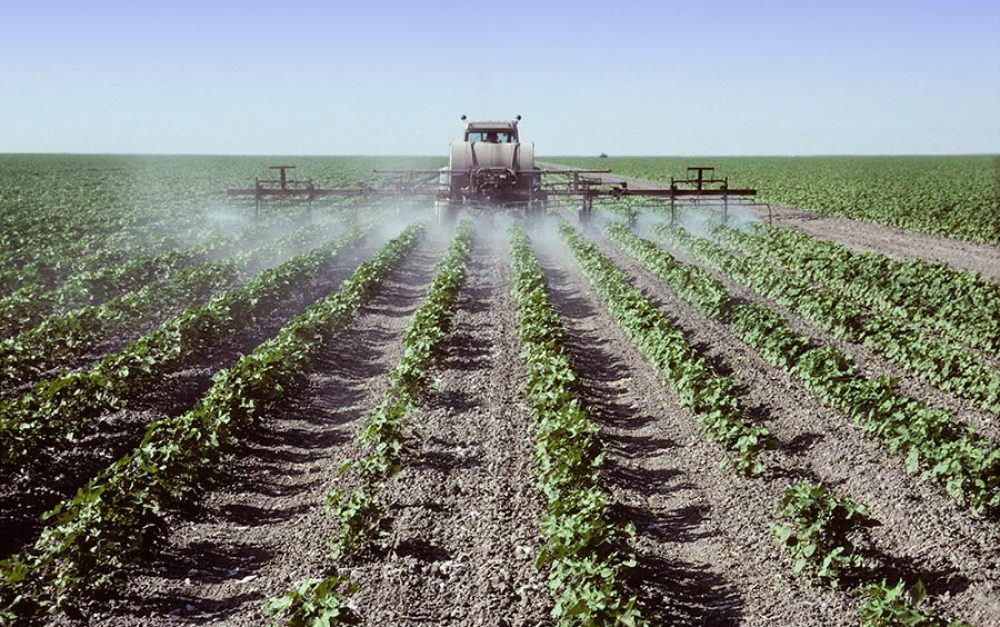Monsanto’s latest genetically engineered (GE) seeds are wreaking havoc this season in soybean country. “Xtend,” the corporation’s new GE soybean, is engineered to tolerate application of the drift-prone herbicide dicamba. The seed was approved in 2015, and now soybean farmers who did not adopt it are reporting damage to their crops from dicamba drift.
And the damage is extensive. An estimated 200,000 acres of soybeans have been lost so far on farms in Arkansas, Tennessee and Misssouri. Growers of other crops, such as peaches, are suffering significant losses as well. How did this happen?
Dicamba, a 45-year-old herbicide, is known to be extremely toxic to a wide range of plants, including fruits, vegetables — and non-GE soybeans. Monsanto’s new dicamba-resistant crops are only supposed to be sprayed with a new formulation of dicamba, which is less likely to drift onto nearby fields.
The hitch is that while the U.S. Department of Agriculture approved Monsanto’s new GE dicamba-resistant soybean seeds back in 2015, EPA has still not approved the new formulation of the dicamba. So farmers who buy the new seed are using the old, drift-prone version of the herbicide — which of course is not approved for use on soybeans.
In a recent NPR article, University of Arkansas scientist Tom Barber commented:
“[Farmers are] afraid that they’re not going to be able to grow what they want to grow. They’re afraid that they’re going to be forced to go with that technology.”
This system is broken
Monsanto claims that it went ahead and put the “Xtend” soybeans on the market because the seeds offered benefits to farmers besides resistance to dicamba — such as higher yields. The corporation insists it warned farmers not to use dicamba on the dicamba-resistant seeds.
But for farmers struggling with “superweeds” that are already resistant to RoundUp, “Xtend” seeds offered use of an additional herbicide to manage their increasingly urgent weed problem. So some farmers applied dicamba this season, which is currently available for legal purchase under a variety of brand names such as Banvel, Diablo, Oracle and Vanquish.
Notably, even if Monsanto’s new and less-volatile dicamba formulation had been on market this season, it may not have changed anything. It’s quite likely that farmers would (and will) still use these much cheaper, drift-prone generic products.
Once again, the agencies responsible for approving GE crops have failed to protect either farmers and rural communities. PAN Senior Scientist Marcia Ishii-Eiteman recently explained the failures of the current system:
No agency is looking out for farmers, or at the bigger picture. No agency is considering — and making decisions based upon — the broader impacts of these pesticide-promoting GE crops on farmers’ livelihoods, and on the social and economic well-being and health of rural communities.”
Recipe for disaster
Dicamba is responsible for the third highest number of drift-related crop damage incidents in the U.S. It is extremely toxic to virtually all broadleaf plants (i.e. plants that are not grasses), including fruits, nuts and vegetables, non-GE cotton and soybeans, and field-edge plants that provide critical habitat for pollinators and other beneficial species.
And even the new, less drift-prone formulation is not likely to be an effective tool for long. We know from watching weeds grow resistant to glyphosate (the main ingredient in Monsanto’s RoundUp) that herbicide resistance develops quickly.
Jason Norsworthy, a weed expert at the University of Arkansas, recently conducted a study to test how quickly pigweed — the main weed of concern in soybean fields — becomes resistant to dicamba. He found pigweed plants began to survive heavy doses of the herbicide in just three generations. With increased use of dicamba, a new generation of superweeds is just around the corner.
Speak up today! A federal review and update of our broken national GE rules is underway right now. Sign onto our petition urging the leaders of USDA and EPA to prioritize protection of farmer livelihoods and community health over Monsanto’s marketshare.







